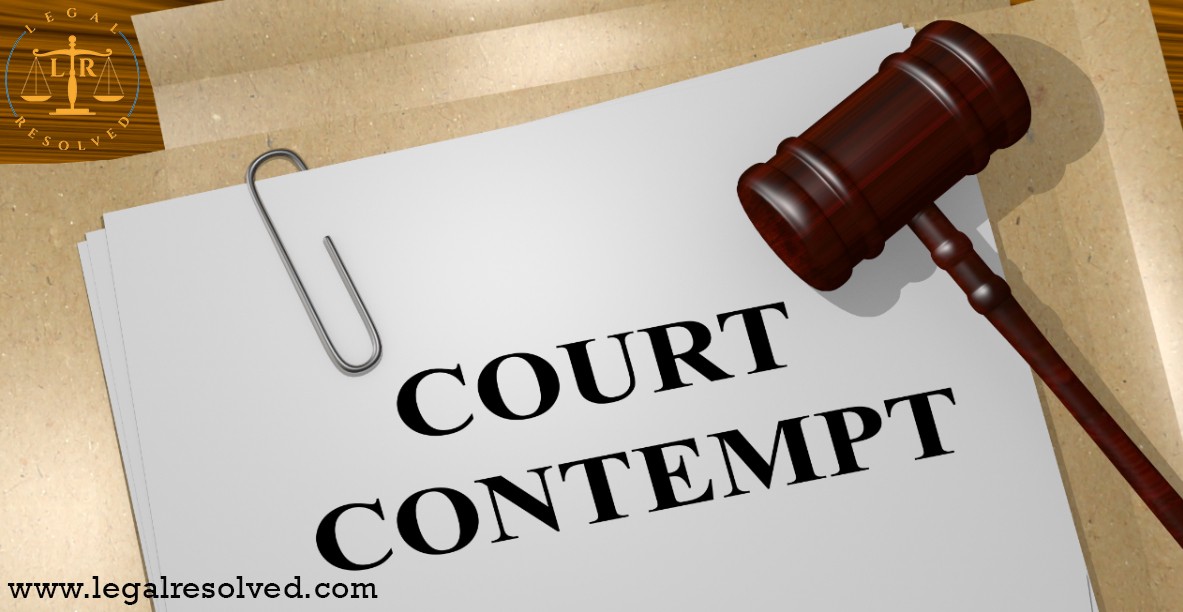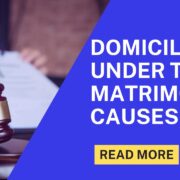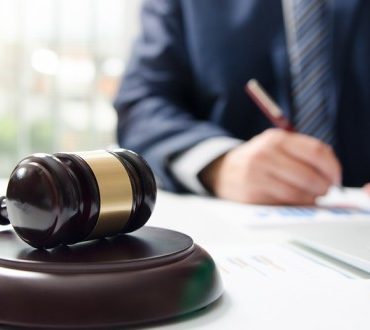Contempt at The Magistrate Court Of The FCT: Power of the Court to Cite for Contempt.

Chukwuebuka S. Okeke, Esq.
On the 23rd of March, 2021, various social media platforms were flooded with the news that at Magistrate Court No.2 holding at Wuse 2, Abuja, a legal practitioner had been cited for and convicted of contempt in facie curiae. As expected, this news received varying reactions from legal practitioners.
In a statement by the Secretary of the Nigerian Bar Association, Abuja Branch; the Unity Bar acknowledged that Counsel was summarily convicted for contempt because he interjected while the Learned Magistrate was delivering the Court’s Ruling. The Unity Bar also impliedly accepted that the action of Counsel in Court was “unruly“.
A learned colleague, Mr. Sekpe Benjamin Benabraham, who happened to be in Court on the said day, has given a detailed eyewitness report of what transpired in Court. Mr. Benabraham reports that the legal practitioner was cited for contempt because, while the Learned Magistrate was delivering the Court’s Ruling, Counsel interjected and made an allegation (in open court) that there was a conspiracy against his client. Mr. Benabraham also reports that when the Learned Magistrate instructed Counsel to sit down or be cited for contempt, Counsel retorted that the Learned Magistrate can go ahead and cite him for contempt.
Mr. Benabraham finally reports that while in the dock and expected to purge himself of his contempt, Counsel told the Learned Magistrate to “calm down”. I think we can give credence to Mr. Benabraham account of events, as he repeatedly stated that he was not holding brief for or defending any of the parties involved in the sordid affair which played out in Court.
Having regard to the statement of the Unity Bar and the eyewitness report of Mr. Sekpe Benjamin Benabraham, we have two critical events:
- An officer of the Court interjected while the Court was handing down its decision on an application before the Court; and
- In the face of the Court, an officer of the Court stated that there is a conspiracy against his client (I need only add that it takes at least two to conspire).
The flippant statement which essentially asked the Learned Magistrate to do his worst aside; one must ask, if the two events listed above are not contemptuous, what is?
I have seen several posts to the effect that an inferior court of record does not have the jurisdiction to summarily punish for contempt in facie curiae. These posts were essentially geared at asserting that the Magistrates’ Court of the Federal Capital Territory did not have the requisite jurisdiction to summarily punish the legal practitioner for contempt. The decision of the Supreme Court in INEC v. Oguebego [2018] 8 NWLR (Pt. 1620) 88 is cited as authority for this proposition.
I have read the decision in INEC v. Oguebego supra. At Page 101G – H of the law report, Nweze, JSC held: “A superior court of record has the inherent jurisdiction to deal with contempt in facie curiae and punish for the offence summarily. It must once again be emphasised that the summary power of punishing for contempt should however, be used sparingly and only in serious cases…”
Colleagues, having read the leading and concurring Judgments in INEC v. Oguebego supra, and I am comfortable in stating that nowhere therein did apex Court hold that an inferior court of record has no power to summarily punish for contempt in facie curiae. The Supreme Court simply reiterated the power of a superior court of record to punish for contempt.
In fact, the appeal before the Supreme Court arose from a Ruling of the Federal High Court, and not an inferior Court of record. In this wise, it is now settled that that decision can only be referred to when the facts are at least similar.
Furthermore, logically, can the assertion erroneously credited to INEC v. Oguebego supra even be the law? Are we saying that I can walk into a Customary Court right this moment, disrupt the Court’s proceedings by hauling insults at the presiding officers; and in such a situation, the Customary Court will be impotent to hold me in contempt? I am told that Dimgba, J. of the Federal High Court once said “it has to make common sense to make legal sense”.
I submit, that while the inherent powers of a superior Court of record may find constitutional expression in Section 6(6)(a) of the Constitution of the Federal Republic of Nigeria, 1999 (as altered); nothing in the Constitution or any other written law has derogated from or deprived inferior Courts of record of their inherent powers and jurisdiction.
In fact, the existence of inferior Courts of record finds constitutional expression in Section 6(4)(a) of the Constitution. Thus, all Courts, including inferior Courts of record, have inherent powers which are an adjunct of the jurisdiction and judicial powers imbued in all Courts created by law. See: Erisi v. Idika (1988) 2 NWLR (Pt. 78) 563.
In the situation under consideration, I am of the opinion that by alleging an ongoing conspiracy against his client in facie curiae, the legal practitioner called the integrity of the Court into question. This was not just an allegation of bias, but an allegation of a calculated attempt to pervert the course of justice. In this wise, the applicable legal maxim is: de fide et officio non reciputur quaestio, sed de scientia sive sit error juris sive facti. This means that the honesty and integrity of a judge cannot be questioned, but his decision may be impugned for error, either of law or of fact. See: The Secretary, Iwo Central L.G. v. Adio [2000] 8 NWLR (Pt. 667) 115.
I consider what played out in the Magistrates’ Court to be similar to the facts of Obijuru v. Ozims [1978] 1 LRN 118. In this case, the defendant wrote a letter to the Court and made allegations that essentially meant that before it was delivered, the plaintiff had received foreknowledge of the Court’s Judgment. Although the defendant eventually withdrew his allegations and apologized to the Court; Ogwuegbu, J. (as he then was) still found the defendant guilty of contempt.
Is it the case that a legal practitioner has never been found guilty of contempt for his actions in conducting his client’s case? The answer is firmly in the negative. In Aneke v. Anakweze (1982) 8, 9 and 10 C.A. 145, the Court of Appeal convicted a lawyer for contempt, because he aided his clients in disobeying the orders of the Court. This decision was confirmed by the Supreme Court in Anakwenze v. Aneke [1985] 1 NWLR (Pt. 4) 771.
To this end, I am persuaded that as colleagues, we have a responsibility to fervently defend the Bar. However, as officers of the law, we have a greater obligation to speak truth, even to the Bar itself. My principal would always say that lawyers are not ordinary people, but a special breed, who like Caesar’s wife, must always be above board.
Before concluding, it is necessary to review the ethical connotation of what transpired in the Magistrates’ Court. Rule 31(1) of the Rules of Professional Conduct for Legal Practitioners, 2007 mandates that “A lawyer shall always treat the Court with respect, dignity and honour“. Rule 31(2) also mandates that “Where a lawyer has a proper ground of complaint against a judicial officer, he shall make his complaint to the appropriate authority“.
With respect, from the content of the Unity Bar’s press release and the eyewitness statement of Mr. Benabraham, the legal practitioner did not treat the Magistrates’ Court of the Federal Capital Territory with the respect, dignity and honour which it commands as an arbiter in the temple of justice. If he disagreed with the decision of the Learned Magistrate, his client had the right of appeal. If he was concerned with the impartiality of the Learned Magistrate, he had the right to write a petition to the appropriate authority and make his case. There is no moral or ethical basis upon which Counsel could castigate the Court to its face.
Colleagues have asserted that the Learned Magistrate was overcome with anger, and wielded the power to punish for contempt in anger. Indeed, from the report of Mr. Benabraham, the Learned Magistrate was infuriated (I dare say, who wouldn’t be?).
However, the fact remains that the legal practitioner stopped the ‘Court‘ from delivering it’s Ruling. The fact also remains that the legal practitioner accused the ‘Court’ of conspiracy against his client. The fact also remains that the legal practitioner invited the ‘Court’ to do its worst. The fact also remains that when asked to purge himself of his contempt, the legal practitioner flippantly asked the ‘Court’ to calm down. In all that transpired, the legal practitioner was not interjecting or addressing the Learned Magistrate, his was casting aspersion on the Court.
I am persuaded that the action of the legal practitioner as discussed and highlighted above were contemptuous. In the face of this contempt in facie curiae, I am convinced that the Learned Magistrate had the undoubted jurisdiction to summarily punish the contempt. To argue otherwise would be to tacitly endorse bringing a Court into disrepute. I submit that this would amount to a defence of the Bar; it is precipitate the destruction of our cherished profession.
Lawyard is a legal media and services platform that provides enlightenment and access to legal services to members of the public (individuals and businesses) while also availing lawyers of needed information on new trends and resources in various areas of legal practice.













